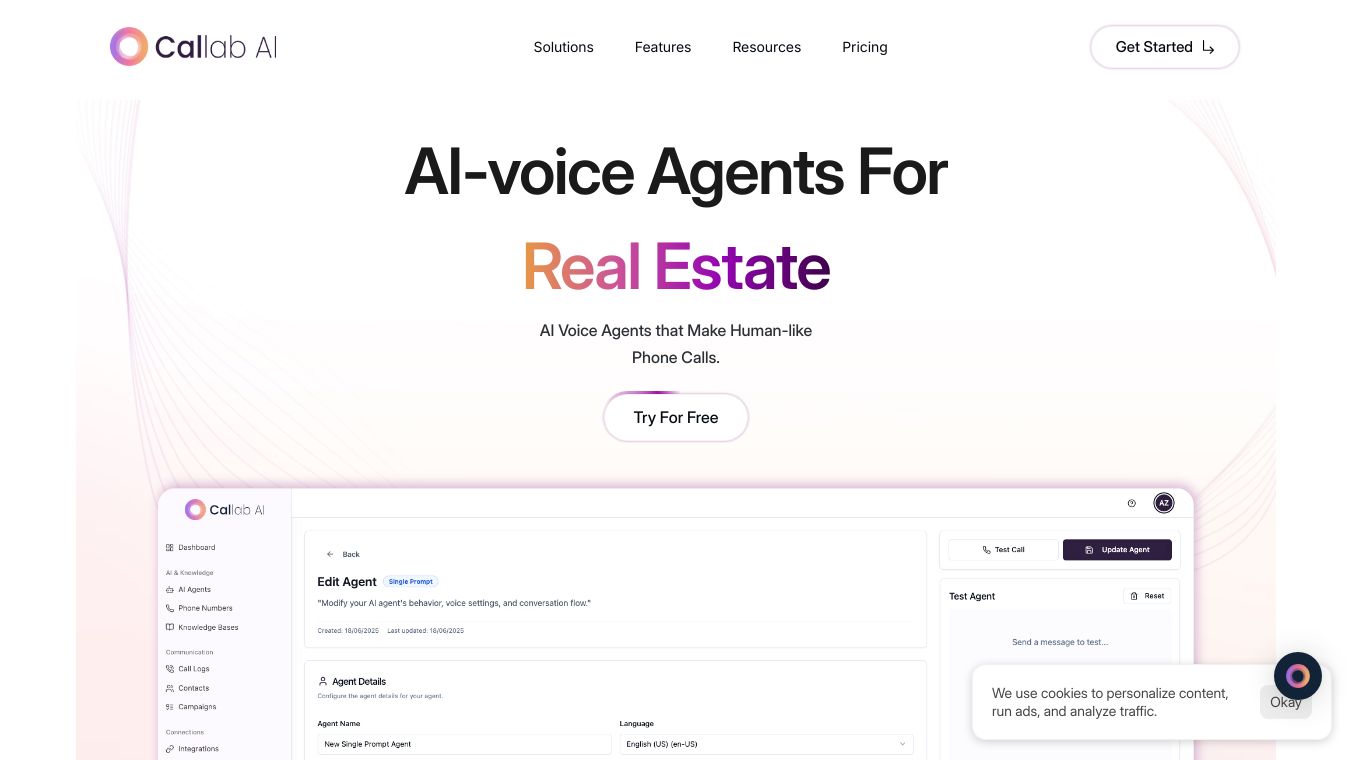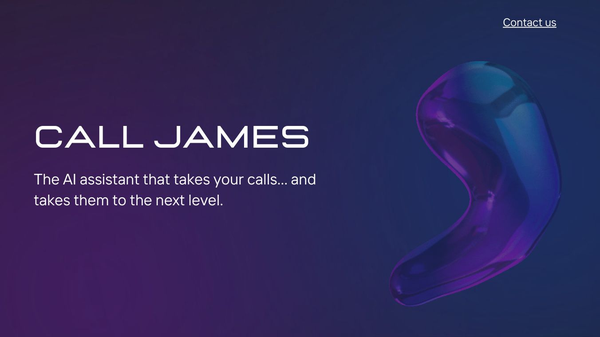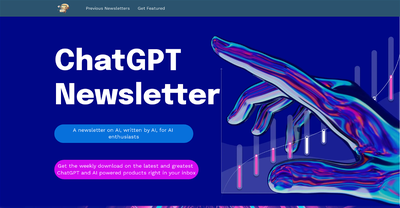MENA AI-voice Launch

Callab AI revolutionizes call handling with AI-powered automation, providing AI-voice agents that help businesses automate and enhance customer interactions. It is designed to sound natural, act intelligently, and work at scale, handling support tickets, sales calls, appointment scheduling, and cold calling. Callab AI offers solutions for healthcare, real estate, debt collection, hospitality, retail & consumers, and contact centers.
Callab AI enables organizations to deploy advanced AI voice agents that seamlessly handle real-world business conversations. Designed for reliability, adaptability, and high performance, our agents are capable of managing complex voice interactions — from inbound customer inquiries to outbound lead qualification — with human-like fluency and operational precision. Built on a unified architecture that combines speech recognition, reasoning, memory, and tool integration, Callab AI delivers voice automation that is deeply customizable, API-driven, and production-ready. Our agents are trained to act with context, follow workflows, and deliver measurable business outcomes — not just conversational output.
Callab’s Knowledge Bank lets your AI reference internal material PDFs, websites, Google Docs, and more during live or async conversations. With Callab ai, every call is fully recorded, transcribed, and sentiment-tagged then centralized in your dashboard for search, review, and action. Callab isn't merely symbolic of a voice-driven AI platform—indeed, it incarnates a potent suite that elevates user engagement and amplifies effectiveness.
To implement and manage Callab AI agents, businesses follow a four-step process: First, 'Build' the AI agent by crafting its core functionalities. Second, 'Test' the agent thoroughly to ensure quality and fix defects. Third, 'Release' the AI agent into a live environment for a smooth rollout. Finally, 'Track' its performance and gather user feedback for continuous monitoring and enhancement.
Callab AI offers three pricing plans:
Basic: $240 / MonthBoost your outreach with AI, built for growing call centers and debt recovery teams. Includes 2000 Minutes/Month, Unlimited AI Agents, Unlimited Languages, Sip Trunk, 5 Knowledge Bases, 2 Concurrency. Overage at $0.12 /Minute.
Advanced: $600 / MonthPower up sales and support with AI, ideal for banks, healthcare, and real estate ops. Includes 6000 Minutes/Month, Unlimited AI Agents, Unlimited Languages, Sip Trunk, 10 Knowledge Bases, 10 Concurrency. Overage at $0.10 /Minute.
Enterprise: Talk to usEnterprise-grade AI for high-volume calling, designed for custom workflows and complex call environments. Offers savings up to 50%, Priority Support, Custom Integrations, Sip Trunk, 60 Knowledge Base, 100 Concurrency. As low as $0.06 /Minute.
The following software solutions integrate with Callab AI, providing opportunities to synchronize data and expand the capabilities of your tech stack:
Zendesk SuiteZendesk is a cloud-based platform enabling businesses to offer customer support via text, mobile, phone, email, chat, and social media.
FreshdeskFreshdesk is an easy-to-use customer service software that helps over 60,000 businesses worldwide create stellar customer experiences.
ZapierFounded in 2011, Zapier has helped over 1.8 million individuals and businesses with their automation needs.
OdooAn open-source suite of integrated apps to manage CRM, POS, website, eCommerce, sales, accounting, warehouse, HR, marketing, and more.
TwilioTwilio is a trusted and reliable partner for businesses looking to improve their communication capabilities.
Voice AI has been a trend and is changing how businesses interact with customers like never before. Especially in 2025, the MENA countries witnessed this swift change driven by high internet adoption and a society that mostly favored mobile-first communication. Significantly, Statista states that the AI market in the MENA region is estimated at USD 1414 million. AI’s ascending to dominant status in the market does not only mean a trend but also proof of its superiority, enabling better customer experiences. With its rapid adaptation of digitalization and tech-awareness, MENA provides a perfect catalyst for this transformative tool. But how can MENA contact centers use this technology to overcome the challenges they are confronted with? In this blog, we are going to learn about how Voice AI is revolutionizing MENA contact centers and what future it holds.
MENA’s Embrace of Voice AI CallsIntensifying competition within the MENA market is compelling contact centers to find groundbreaking solutions to remain ahead. In today’s competitive business landscape, firms acknowledge the strategic benefit of using Voice AI technologies to boost operational efficiency and give outstanding customer experiences.
There is an explicit change in client preferences, such as being inclined to convenience and accessibility. MENA consumers are similar to their global peers in that they expect instant and fluent support through different channels.
Governments of MENA countries employ measures such as subsidies, grants, and business-friendly policies to encourage companies in this field. These activities foster a favorable climate for deploying Voice AI solutions by contact centers; thereby, the adoption rate is increased, and technological improvements are encouraged.
Use Cases of voice AI callsGen AI-powered automated voice AI inbound calls and outbound calls are capable of enhancing customer engagement while reducing customer support operation costs. Let us understand some concrete use cases of Voice AI across MENA regions:
Marketing and SalesVoice AI is transforming marketing and sales strategies in MENA’s contact centers. Using lead generation algorithms and personalized recommendation engines, companies can use Voice AI to provide customers with tailored product recommendations and exclusive offers. The personalized nature boosts customer engagement, sales, and brand loyalty in the competitive market.
HealthcareVoice AI has significantly impacted the transformation of healthcare services in MENA. Regarding symptom assessment, the Voice AI-powered virtual assistants allow patients to articulate their symptoms, resulting in more precise diagnoses and timely medical interventions.
Voice AI platforms will also allow healthcare providers to conduct patient education initiatives that will make people knowledgeable about their health and enable them to make the right decisions. Ultimately, the healthcare outcomes will be better, and patient satisfaction will be guaranteed.
Education and TrainingWithin education and training, Voice AI is instigating a revolution of learning methods throughout MENA. Educational institutions can address different learning styles and promote student involvement by developing immersive learning environments and offering personalized coaching using Voice AI-based virtual tutors. In addition, real-time feedback and adaptive learning systems provide individual learning experiences so that every learner gets the help they need to be successful.
From boosting sales to improving healthcare and education outcomes, Voice AI demonstrates its versatility and effectiveness. As organizations in MENA increasingly adopt voice AI call solutions, they are uncovering new opportunities to deliver value, streamline processes, and elevate customer experiences. This brings us to the broader discussion on how businesses can leverage these benefits to drive cost savings and operational efficiency.
Benefits of Gen AI Voice CallsVoice AI platforms are redefining how industries in the MENA region operate, bridging the gap between customer expectations and operational capabilities. By offering tailored solutions across sectors, this technology is delivering tangible benefits.
Listed below are some advantages of deploying Voice AI for industries:
Swift issue resolution: AI technology in contact centers across the MENA region facilitates solutions by offering round-the-clock availability, self-service features, and task automation.
Cost savings: Integration of Voice AI in call centers in the MENA region cuts costs by enhancing labor productivity, reducing waiting times, and optimizing resource allocation.
Enhanced customer satisfaction: Voice AI contributes to increased customer satisfaction levels by enabling personalized interactions, providing omnichannel access, and accelerating troubleshooting processes.
Multilingual assistance: Utilizing Voice AI in contact centers in the MENA region allows support to cater to the populations across different areas. This ensures customer communication in varying languages, leading to improved customer engagement.
Valuable data insights: Implementation of Voice AI technology in MENA contact centers offers access to insights through voice sentiment analysis, voice pattern recognition, and feedback mechanisms.
How are MENA businesses currently leveraging Voice AI?Let us understand some examples of how businesses are using Voice AI in various industries:
Banking: Banks in the MENA region already use voice AI to cater for different services, including account opening, transaction confirmation, and fraud detection.
For example, ADIB call center queries dropped by 20% and 80% were resolved through chat banking, enhancing customer experience and engagement. With the help of our support, ADIB developed the ADIB Chat Banking, the first ever Emirati customer care chatbot on WhatsApp and the web.
As a result of the strong backend that is interconnected with the CRM systems, over 150k+ chats per month in various Arabic dialects and English are executed, thus making the job easier for customer support agents and eventually aiding them in improving their efficiency.
Telecommunications: MENA telecommunication enterprises have used Voice AI for voice banking, service troubleshooting, and upgrades.
E-commerce: MENA region e-commerce retailers have incorporated Voice AI technology for order tracking, returns processing, and product recommendations.
Travel and Hospitality: In the travel and hospitality industry of the MENA region, Voice AI is deployed for tasks including flight booking modification, hotel information inquiry, and concierge service.
Challenges and ConsiderationsImplementing Voice AI in the MENA region poses specific challenges that require careful consideration:
Data privacy and security concerns: As with other parts of the world, the MENA region confronts data security and privacy problems. Given the sensitivity of personal data, maintaining local law compliance and ensuring data protection are the essential requirements for the proper use of Voice AI.
Integration with existing systems and infrastructures: The integration of Voice AI into existing designs and structures may be complex, especially in the MENA region, where it is expected to have many legacy systems.
Availability of high-quality training data: The need to develop a Voice AI system that can precisely understand and respond to different languages and various dialects that are assorting the MENA region constitutes the quest for high-quality training data.
Cultural differences and preference for human interaction: The MENA region’s ethnicities and nuances will influence customers’ adoption and integration of voice AI technology. For instance, there might be cases where there is a need for human participation rather than an automated system.
Best Practices To FollowTo address challenges in implementing Voice AI in the MENA region:
Transparent data handling: Follow regional regulations and disclose data practices transparently.
Seamless integration: Adopt uniform APIs to avoid incompatibilities with the current infrastructure.
High-quality training data: Invest in multiple data collection methods to ensure regional languages are considered.
Balanced automation: Put human intervention in the front seat for complex questions and empathetic conversations.
Building a Voice-Enable FutureThe future of Voice AI in MENA contact centers holds promising advancements:
Integration with AI assistants: Voice AI combines AI and conversational AI to enable more intelligent interactions. This integration will empower more intelligent and smooth customer support since the advanced algorithm predicts needs and delivers proactive support.
Multimodal experiences: Anticipate creating multi-sensory experiences that unify voice with chat, video, and AR/VR. Such integrated experiences would create an integrated engagement platform, facilitating smooth transitions between communication channels depending on end-user preferences and context.
Hyper-personalization: Voice AI will provide hyper-personalization by employing customer data and preferences. This individualized approach will be carried out through unique experiences tailored to specific needs, resulting in stronger customer loyalty and satisfaction.






Comments
Please log in to post a comment.